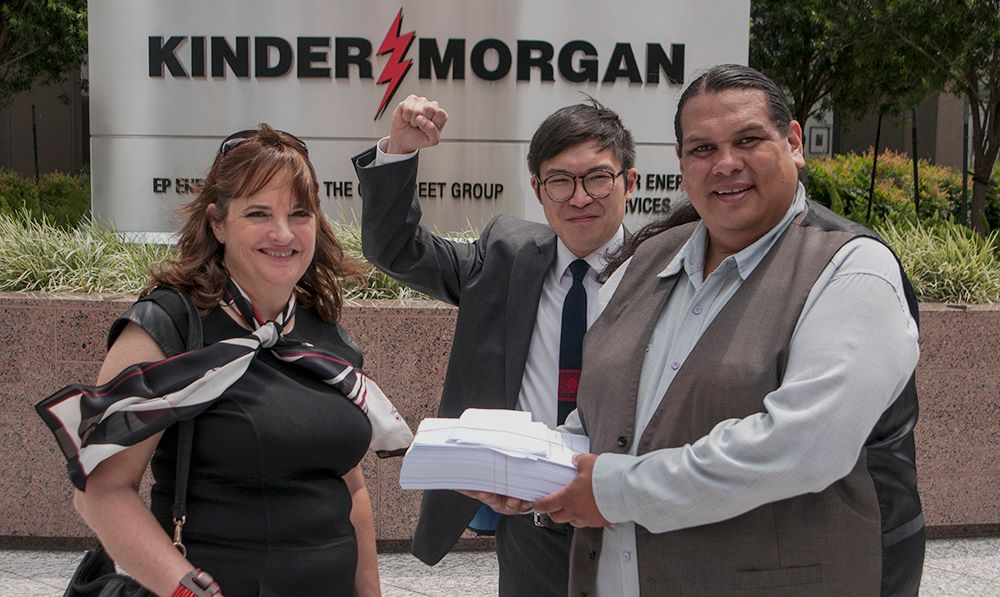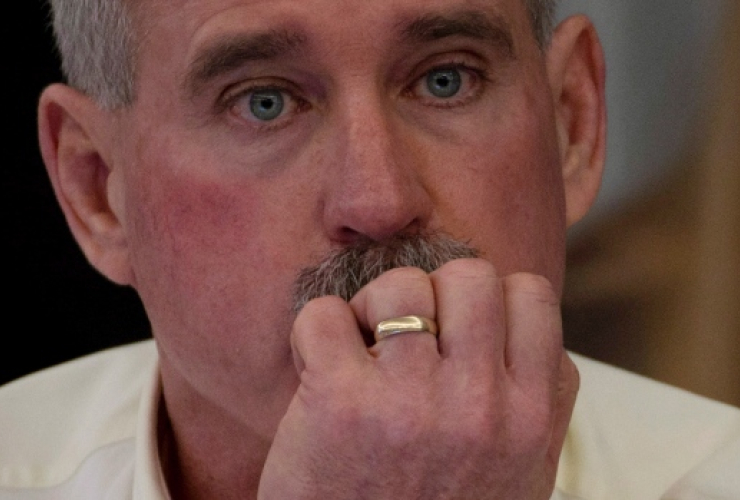Environmentalists and Indigenous leaders are threatening "an onslaught of litigation" to block Texas-based energy giant Kinder Morgan's proposed Trans Mountain pipeline expansion project to the Vancouver coast.
Environmental lawyer Eugene Kung said the plan is inspired by similar tactics that were used to obstruct Alberta-based Enbridge's proposal to build the Northern Gateway pipeline to the northwestern B.C. coast.
"In the Enbridge situation there have been a number of lawsuits filed by First Nations based on having experienced flaws in the process," said Kung, a lawyer from West Coast Environmental Law. "Many people are expecting nothing less than a similar onslaught of litigation, which would take years to complete.”
Kung made the comments after he and Rueben George, an activist and member of Tsleil-Waututh First Nation, spoke out against the Trans Mountain expansion at Kinder Morgan's annual general meeting of shareholders in Houston, Texas.
"They interrupted me three times during my presentation," said George. "They made me really stick to the two-minute time period and they threatened to kick me out even before I was done."
The pipeline is one of several proposals on the table to help Alberta's oilsands industry expand and deliver their product to new markets. Enbridge's Northern Gateway project was approved with more than 200 conditions - including that it begin construction before the end of 2016, but the Alberta-based company recently requested a three-year extension.
In his presentation to the Kinder Morgan shareholders, George said the project faced intense opposition from every community and First Nation in the region:
"They are not taking into consideration this [stance] that First Nations have against this pipeline. I told them how confident we are that we’re going to do whatever it takes to stop this. We have 100 per cent confidence in our court case by looking at the outcomes of our relations that have brought industry to court like this."
Kinder Morgan says it "engaged productively" with First Nations
Kinder Morgan, North America's largest energy infrastructure company, disputed George's allegations. It said it has "engaged productively" with First Nations communities about the Trans Mountain expansion project. It also said it was committed to operating in an environmentally responsible manner.
"In fact, a substantial majority of the First Nations most directly affected by the Trans Mountain pipeline have expressed their support for the project," the company said in a statement. "Despite Kinder Morgan’s repeated attempts to meet with the Chief and Council of the Tsleil-Waututh Nation to discuss the project, they have refused to engage with anyone except the Federal Government."
The company also said that Tsleil-Waututh Nation is always welcome to begin consulting with them.
Another advocacy group - SumOfUs - which attended the meeting on behalf of two major U.S. pension funds, said that some other shareholders agreed with his concerns.
"Kinder Morgan has jeopardized its social license to operate and we believe that shareholders are starting to listen to that message," said Lisa Lindsley, a spokeswoman of SumOfUs."Long term shareholders are very concerned about Kinder Morgan’s disregard for local communities."
Kung, from West Coast Environmental Law, said the groups, including Vancouver-based Stand, are trying to show that local opposition is a threat that can derail potential profits.
"I think what we’re seeing is that you can’t run roughshod over communities, over First Nations, over municipalities, when you’re trying to build a pipeline," he explained. “Ultimately I think the shareholders at Kinder Morgan are not happy right now. They’ve had a rough year and really what we brought was a message of risk and uncertainty for one of their big growth projects."
Sven Biggs of Stand said the federal government will have a hard time approving the Trans Mountain after it set out new criteria this year requiring it to evaluate the climate change-related impacts of each project and ensure adequate consultations with First Nations and local communities.
"I think you have to evaluate each pipeline individually," said Biggs. "But it’s hard to imagine how any pipeline will meet a rigorous climate test at this point, especially if our federal government is serious about meeting the 1.5 degree climate change goal that they set in Paris."
The National Energy Board, the federal agency that staged hearings to review the Kinder Morgan proposal, declined to comment on the project, explaining that it would give the government its recommendations before May 20, 2016.




Comments